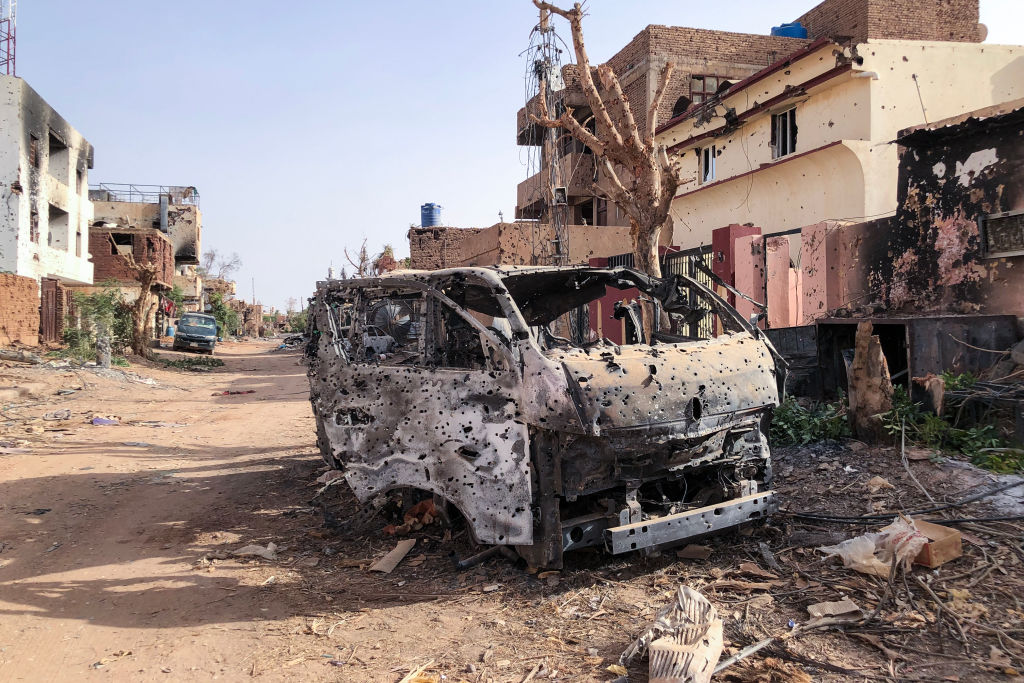ADF STAFF
More than 500 days after it began, Sudan’s bloody war between rival generals appears unlikely to end as both sides refuse to discuss peace and, instead, vow to continue fighting.
“We will not put down our weapons as the rebellion continues. We will not co-exist with the rebels, and we will not forgive them,” Sudanese Armed Forces (SAF) chief Gen. Abdel Fattah al-Burhan, the de facto head of the country, said in August as he denounced the latest international attempt to negotiate an end to the fighting.
Since fighting broke out in April 2023 between al-Burhan’s SAF and the Rapid Support Forces (RSF), controlled by his rival, Gen. Mohamed Hamdan “Hemedti” Dagalo, large parts of Sudan have been laid to waste. Crucial infrastructure has been damaged or destroyed. Agricultural production has fallen by 60% or more. More than 10 million people are displaced, with many at risk of starving.
As the generals refuse to yield, Sudanese citizens are choosing sides. Mohamad Awadallah, a merchant, joined a group of new recruits for training recently at a former soccer stadium in SAF-held territory.
Awadallah joined the SAF after RSF fighters took control of his home state, Sennar.
“In Sennar, I saw death,” Awadallah told PBS News. “There were rapes. The RSF were killing anyone they found in front of them. The situation in the country is getting worse, and we’re afraid of being displaced again to another state.”
Awadallah is part of the SAF’s attempt to push back the RSF, which has captured some of Sudan’s most economically important territory. The RSF controls most of Darfur, home to major gold mines, the oil-rich Kordofan region, large parts of the capital region and key farmland in the southeast. In early August, the RSF made its first incursion into SAF-held Blue Nile state.
The SAF controls the Red Sea coast and its ports, the Nile River corridor, and agricultural land in Gedaref State. This year, the SAF retook the national broadcaster in Omdurman. It fended off an RSF assault on an SAF installation in Khartoum Bahri in early September.
With the help of allied militias, the SAF still controls North Darfur, blocking the RSF from sweeping north and east to Port Sudan. North Darfur is home to three displaced-persons camps and about 500,000 people who have fled the most recent fighting. SAF airstrikes and RSF bombardments have wrecked large parts of the capital, el-Fasher, and nearby communities.
“The situation in el-Fasher is chaotic,” Michel-Olivier Lacharite, head of Doctors Without Borders’ emergency program, told Al Jazeera.
Since April 2023, more than 7.1 million Sudanese residents have fled the fighting, some more than once. They join nearly 3 million other displaced people already living in the country.
More than 2 million Sudanese have fled the country entirely. Many live in camps in the Central African Republic, Chad, Egypt and South Sudan. The U.N. describes Sudan’s predicament as the world’s worst displacement crisis.
All of Sudan’s 18 states report displacement. Although numbers are highest in the Darfur region, Gedaref, Sennar and White Nile states have seen their displaced populations grow to 10 times their pre-conflict size, according to the United Nations International Organization for Migration (IOM).
“Imagine a city the size of London being displaced. That’s what it’s like, but it’s happening with the constant threat of crossfire, with famine, disease and brutal ethnic and gender-based violence,” IOM Director General Amy Pope said in a recent statement.
Until last month, the RSF and SAF blocked food and medicine shipments for fear the material would benefit their enemies. The blockades put millions of Sudanese at risk of starving. Poor road conditions during the rainy season have hindered food deliveries since the warring sides opened the borders to aid convoys.
Despite Sudanese people’s suffering, neither general appears willing to relent. In late August, al-Burhan declined to send negotiators to a new peace conference in Switzerland. He declared that his forces would fight their rivals for “100 years.”
Previous peace conferences in Saudi Arabia and Bahrain have failed to stop the fighting, as has the African Union High Level Panel on Sudan launched this year.
Both sides continue to get support from outside — the United Arab Emirates and Libyan Field Marshal Khalifa Haftar in the case of the RSF, Egypt and Saudi Arabia in the case of the SAF.
At the negotiating table in Geneva, U.N. Chief Coordinator for Sudan Mukesh Kapila summed the situation up this way: “I don’t think the two belligerents are interested in talking to each other.”

